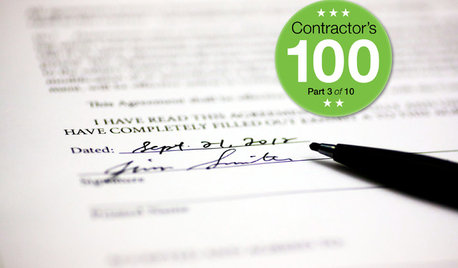contract with home sale contingency clause
annandale
17 years ago
Related Stories

BUDGETING YOUR PROJECTConstruction Contracts: What to Know About Estimates vs. Bids
Understanding how contractors bill for services can help you keep costs down and your project on track
Full Story
CONTRACTOR TIPSWhat to Look for in a Contractor's Contract
10 basic ingredients for a contract will help pave the way to remodel happiness
Full Story
MOVING5 Risks in Buying a Short-Sale Home — and How to Handle Them
Don’t let the lure of a great deal blind you to the hidden costs and issues in snagging a short-sale property
Full Story
MOVINGWhat Those Home-Sale Disclosures Are Really Saying
Avoid costly surprises by knowing what’s included in a home seller’s disclosure, what’s not and what you can do if you suspect foul play
Full Story
ARCHITECTUREDesign Practice: Getting Paid
Pro to pro: Learn how to manage contracts and set up the right fee structure for your work
Full Story
MOVINGTips for Winning a Bidding War in a Hot Home Market
Cash isn’t always king in a bidding war. Get the home you want without blowing your budget, using these Realtor-tested strategies
Full Story
MOVINGHiring a Home Inspector? Ask These 10 Questions
How to make sure the pro who performs your home inspection is properly qualified and insured, so you can protect your big investment
Full Story
REMODELING GUIDESConsidering a Fixer-Upper? 15 Questions to Ask First
Learn about the hidden costs and treasures of older homes to avoid budget surprises and accidentally tossing valuable features
Full Story
MOST POPULARContractor Tips: Top 10 Home Remodeling Don'ts
Help your home renovation go smoothly and stay on budget with this wise advice from a pro
Full Story
MOVINGHome-Buying Checklist: 20 Things to Consider Beyond the Inspection
Quality of life is just as important as construction quality. Learn what to look for at open houses to ensure comfort in your new home
Full Story








berniek
talley_sue_nyc
Related Professionals
Brushy Creek Architects & Building Designers · Portsmouth Architects & Building Designers · Augusta General Contractors · Maple Heights General Contractors · Milton General Contractors · Muskogee General Contractors · Nampa General Contractors · Norfolk General Contractors · Titusville General Contractors · Kansas City Home Stagers · Kennesaw Home Stagers · Verona Home Stagers · Little Egg Harbor Twp Interior Designers & Decorators · Morton Grove Interior Designers & Decorators · Mount Laurel Interior Designers & Decoratorsquip
gardensgirl
annandaleOriginal Author
chispa
jeff147
halb
talley_sue_nyc
triciae
talley_sue_nyc
quip
annandaleOriginal Author
talley_sue_nyc
therealmikebrown